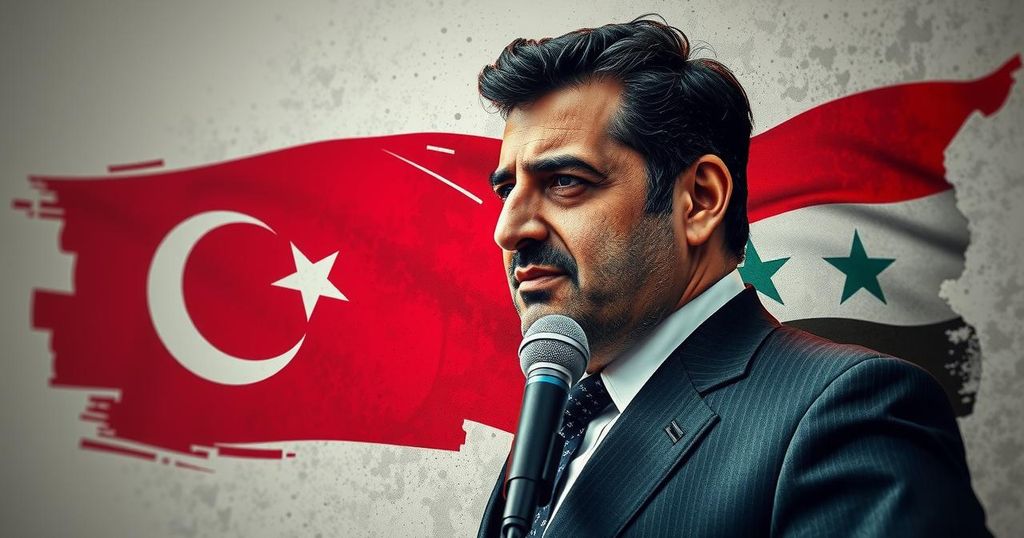World news
ASIA, ASSAD, BASHAR AL - ASSAD, DID, ERDOGAN, EUROPE, EUROPE/ASIA, EUROPEAN UNION, FIGHTER JETS, FOREIGN POLICY, FRANCE, KURDISTAN WORKERS ' PARTY, MANBIJ, MILITARY ACTIONS, NORTH AMERICA, PKK, REC, SYRIA, SYRIAN CIVIL WAR, SYRIAN CONFLICT, SYRIAN DEMOCRATIC FORCES, TURKEY, UNITED STATES, WAR
Oliver Grayson
0 Comments
Turkey’s Growing Influence Post-Assad: Challenges and Opportunities for Erdogan
The fall of Bashar al-Assad has strengthened Turkey’s regional influence under President Erdogan while also imposing strategic challenges. Erdogan’s initiatives aim to eliminate Kurdish presence along the Turkish border and manage the Syrian refugee situation. The outcome of these maneuvers will depend on the new Syrian government’s policies and the evolving landscape of international relations, particularly with Russia.
The recent downfall of Bashar al-Assad has significantly altered the geopolitical landscape in the Middle East, enhancing Turkey’s role in the region while simultaneously presenting challenges for President Recep Tayyip Erdogan. Assad’s refusal to cooperate with Erdogan, who sought a collaborative framework for Syria’s future, ultimately resulted in his political demise. As rebel factions, notably Hayat Tahrir al-Sham (HTS), gained momentum against Assad, Turkey positioned itself strategically alongside these groups, illustrating its influence over the developments in Syria.
Turkey shares a lengthy border with Syria, over 900 kilometers, which heightens its vested interest in the aftermath of Assad’s removal. Erdogan’s persistent objective has been to eliminate any Kurdish influence along this border, especially from the Syrian Kurdish People’s Protection Units (YPG), which Ankara connects to the banned Kurdistan Workers’ Party (PKK). The recent capture of Manbij, previously held by US-backed Syrian Democratic Forces, also reflects Turkey’s assertiveness in the region.
Didier Billion, deputy director of the French Institute for International and Strategic Affairs, remarks on Turkey’s involvement, stating that the nation has maintained troops in Idlib since 2017 and has closely monitored the insurgent operations leading to Assad’s downfall. He asserts that Turkey’s intelligence services were aware of the rebel advancements and acknowledges Turkey’s alliance with various factions, despite their ideological differences.
Erdogan’s ambitions extend to establishing a security buffer along the border. Despite the current chaos, the Syrian leadership’s stance remains uncertain. Should the new government favor Kurdish integration, Turkey may face complications in its strategic plans. Furthermore, concerning the millions of Syrian refugees in Turkey, Erdogan aims to repatriate as many as feasible, yet significant numbers will likely remain due to ongoing unrest in Syria and established ties to their host country.
Regarding international dynamics, Billion pointed out that Turkey has previously sought improved relations with Russia, despite the shifting allegiances following Assad’s fall. Russia’s involvement appears diminished, raising questions about the future of military bases within Syria, particularly the key naval facility in Tartus.
Ultimately, in the short term, Turkey emerges as a significant player in the new regional order. However, the evolving political landscape in Syria will ultimately dictate Turkey’s fate and influence. The situation remains fluid, necessitating observant engagement from all involved parties as they navigate the ramifications of Assad’s exit.
The geopolitical situation in Syria has undergone a considerable transformation following the ousting of Bashar al-Assad, a long-standing adversary of Turkey. Turkey, under President Recep Tayyip Erdogan’s leadership, has consistently aimed to enhance its regional influence while thwarting Kurdish autonomy along its border with Syria. This strategic interest is further complicated by the presence of millions of Syrian refugees in Turkey and the complex international relationships involving Russia.
In summary, the fall of Bashar al-Assad presents both opportunities and challenges for Turkey. While the immediate outcomes favor Turkey, especially regarding its Kurdish policies and refugee management, the long-term implications will be dictated by the new Syrian leadership’s approach to governance and international relations. Erdogan’s strategy of establishing a buffer against Kurdish entities remains critical, as does Turkey’s evolving relationship with Russia in the face of shifting power dynamics in the region.
Original Source: www.france24.com




Post Comment